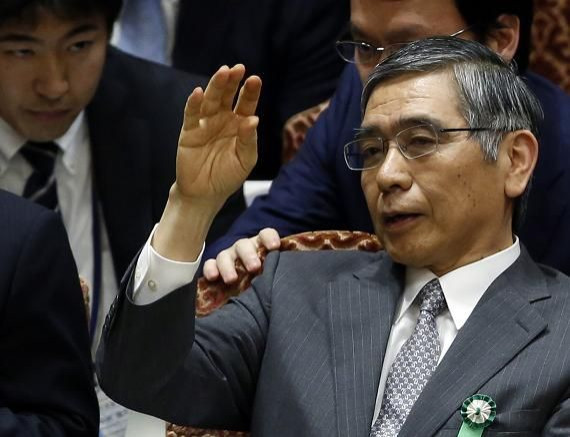Bank Of Japan (BOJ) April 3-4 Policy Meeting Preview: Is Haruhiko Kuroda Japan's Ben Bernanke?

Expectations are high for the Bank of Japan’s monetary policy announcement under its new governor, Haruhiko Kuroda, on Thurs., April 4.
“Unfortunately, the markets’ expectations of the new Governor [Kuroda] are so high that they will be almost impossible to meet, let alone beat,” said Julian Jessop, chief global economist at Capital Economics, in a note to clients.
Japan’s central bank has long been criticized for its relatively conservative monetary policies, and it is now under tremendous pressure to stimulate growth and inflation in an economy that has suffered deflation for 15 years and four recessions since 2000.
Prime Minister Shinzo Abe, who took office in December, has pushed for big government spending and called for aggressive monetary easing by the BOJ. Since Abe first pledged to turn around the nation's flagging economy in November, the Nikkei 225 rose about 34 percent and the yen fell around 15 percent against the dollar.
The yen's depreciation, the rise in stocks and the decline in long-term yields since the start of the Abe administration have stemmed largely from expectations for changes in the BOJ's policy regime.
Now it’s time for the central bank to follow up Abe's talk with bold monetary policy action.
Jessop notes with near certainty that at least one of the two BOJ Board meetings in April will result in a further loosening in monetary policy.
According to Jessop, the most likely outcome is that the Board will announce some small policy changes at the first meeting this week, as a form of “down payment” or signal of intent to reassure the markets, and then follow this up with something more substantial at the second meeting on April 26.
This view is shared by Merrill Lynch Japan Securities’ chief Japan economist Masayuki Kichikawa, who also thinks the BOJ might take a two-stage approach at its April 3-4 meeting. It will likely decide on some of the measures this week: clarification of continued easing until inflation reaches the 2 percent target, and an increase in Japanese government bond purchases.
But, regarding other issues, such as a consolidation of asset purchases with outright-purchase operations, or rinban, and changes to the banknote rule, the BOJ could just announce that it will begin consideration of those issues at the next meeting.
Capital Economics’ Jessop has penciled in the announcement on Thursday of an additional ¥10 trillion ($110 billion) in JGB purchases under the asset purchase program for 2013, which represents a 50 percent increase in the amount of JGB purchases planned for this year.
The BOJ's government bond purchases for the purpose of monetary easing have been limited to bonds of up to three years in maturity. This week’s announcement could see the central bank extend the duration of the bonds it buys to five years.
For April 26, Jessop expects the BOJ to announce the consolidation of the planned JGB purchases under the asset purchase program with those already made as part of the central bank’s regular money market operations, and the setting of a new, higher monthly target for these purchases to be maintained until the 2 percent inflation target is hit.
Mixed Signals
On the eve of Kuroda’s first board meeting as Bank of Japan governor, Abe told parliament that the 2 percent inflation target he imposed on the BOJ may not be reached within two years, the Financial Times reports.
Kuroda, a well-known advocate of aggressive policy easing, was hand-picked by Abe to head the central bank.
This is the first time that the new prime minister has suggested the two-year time frame outlined by Kuroda may not be met. Abe also noted that the BoJ should not pursue the inflation target at “at all costs.”
Abe’s remarks came hours after Kuroda told a parliamentary budget committee he would use all options available to achieve the inflation target in two years by taking "bold measures in terms of quantity and quality."
"It is not easy to break out of 15 years of deflation," he said. “But the BOJ will use all options available and do whatever it takes to show markets its strong commitment.”
"I will adopt bold monetary easing policies that would meet [market] expectations," Kuroda added.
Abenomics
Three months have passed since the Abe administration was launched.
The so-called “Abenomics” has been somewhat effective in bringing about change in the job market and household sentiment via expectations for fiscal and monetary policy alterations as well as a weaker yen and higher stock prices. However, business sentiment remains cautious and export recovery is limited.
Whether the driver of economic recovery switches from government and household spending to corporate investment and exports, especially from late this year or early next year, will probably determine if Abenomics is a success or not, according to Kichikawa.
Economists polled by Reuters expect the Japanese economy to have grown 1 percent in the year ended on March 31.
© Copyright IBTimes 2024. All rights reserved.





















